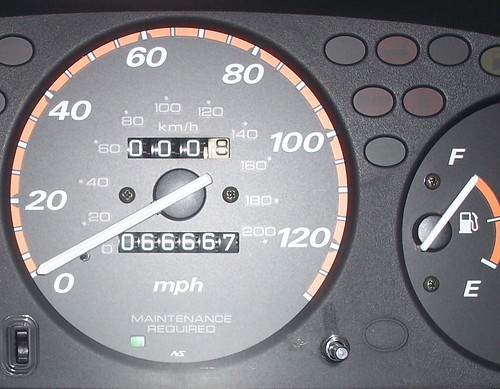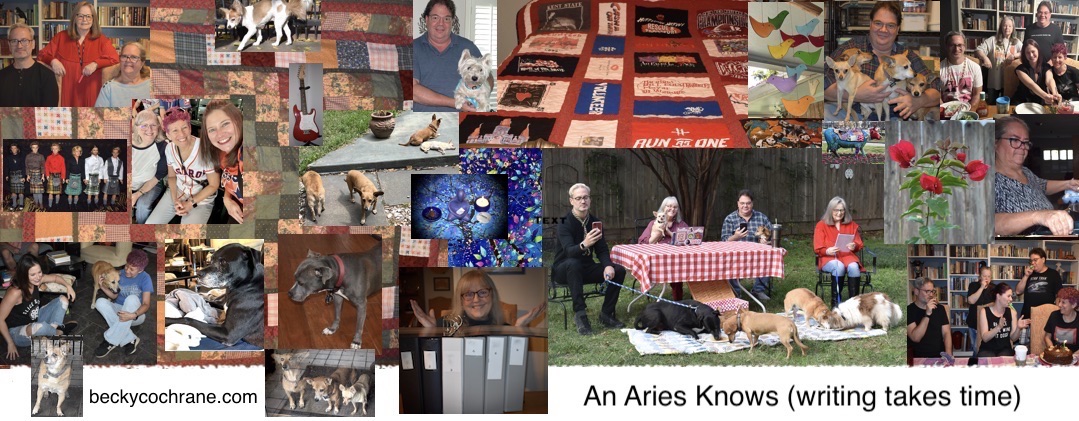
The way we look at numbers is a strange thing. A few weeks ago, nearly a mile after I filled my car with gas, I glanced down and realized the photo opportunity I’d missed. I shot the photo anyway, intending to use it for a post on June 6, then promptly forgot about it.
Tim’s recent post on hate crimes statistics made me think a lot about numbers. One time I read an article about trying to help people conceive of the horrors of the Holocaust. The writer posited that we can’t really conceptualize “six million” dead because our mind can’t see six million of anything. We can easily see six. Six apples. Six pennies. Six books. But six million? There’s no picture for that many in our head.
A number too high to visualize loses impact.
Low numbers, on the other hand, while easy to visualize, make us pull out “relatives.” For example, if we say, “Thirty people died in this flu epidemic,” it’s easy to see thirty. But it’s also easy to think, “Thirty’s not so many in a city of X million or a world of X billion.”
I often thought about this strange concept we have of numbers in relation to AIDS. Because in the early days of the epidemic, that very thing happened. “A thousand people have died? Well, X number died from bubonic plague.” Or “X number have died from cancer.” The numbers didn’t seem so startling in comparison to other catastrophes, so it was hard for activists to get people concerned. But only by getting people concerned could they provoke effective strides toward prevention and treatment.
A number too low never achieves impact.
Except… When a bad number includes someone you know and love, it’s always too many.
No matter how we see (or don’t see) the numbers, to an optimist or an activist, thinking about a problem leads to talking about it. Talking about it leads to doing something about it. Doing something about it leads to making those numbers decrease.
One element of the Kevin Aviance story (which prompted much of this recent discussion in public forums about hate crimes) that greatly disturbed me was the idea that people saw it taking place and did nothing. How many people who saw it had cell phones? At a minimum, couldn’t they have called 911?
And at a minimum, even if we don’t always agree about the meaning of numbers, public discussion and debate may help get a truer reporting of those numbers and ultimately, a decrease in them.
**Update: I had no idea when I wrote this post that there is actually a debate going on in Tim’s comments. I just saw that, and now I look like I’m just exploiting it. Sorry.

No one wants to be bothered. No one wants to be involved. This is why no cell phone calls were made to 911. The mentality of humans is that if there were a few people around, someone would call, and therefore, no one called because everyone assumed someone else would. It’s terrible human nature, but there it is. I would call. But again, I am not the masses. I think differently than most, and I know this.
I am reading this book on Buddhism that is really insightful about learning how to deal with suffering–at least the chapter I am on now. And with suffering, everyone in the world experiences it. It is how you deal with suffering that matters most. If we look away and try to avoid it, it will continue to occur, but if we embrace it, and work through it, we can overcome the suffering, and hopefully not repeat it. Trouble is, most of the general public do not have the ability to see beyond their scope of reality and therefore are not only ignorant but stuck there. We, the few people who appreciate all human life with equality for all genders, sexual preferences, and really personal interests, are the only ones who can actually make the difference with hate, ignorance, and common stupidity. How? Well, that is the question. What are we willing to actually do about it? I teach. I try to impliment a standard for education regarding human people. Other than that, I get involved in little ways but still not heavily. We need an earth mover. We need someone to lead that has that spunk about them. Mostly, we need this person to help get us pointed in the right direction and help us fight for the equality. Otherwise, we all just kind of sit back and wish something else would happen to fix the problem. It’s rather lazy, I admit. I do what I feel I can to make a little difference, but it’s not enough. And I have no idea where else to turn to help. Maybe that is the problem. We all just have Project Response and AIDs, ONE, and so on, but everything seems so overwhelmingly hard. One group here, then another there…sheesh. We need to be just ONE total organization for all people.
I probably should back up anyway. I wasn’t there; I’m just reading information as it comes out, and who knows how accurate it is. In an article I just read, apparently the victim heard people yelling at his attackers to stop beating him, and a stranger walked him to the hospital. So apparently some people did do something, and I should shut up.
Sometimes people are afraid as much as they are indifferent, I think. Or they aren’t sure what they’re seeing or hearing or what they’re supposed to do about it.
One time Tom and I were driving down a major highway and we saw a couple having a fight inside their car. She was screaming. He would hit her (in the face, with his fist).
This was pre-cell phone days. We were at a loss about what to do. Take their tag number? Get off the highway and call the police with the tag number? What good would it do for the police to run down the tag, find the couple, and talk to them? It was only during the act, when he was driving erratically and endangering himself and others, or when he was hitting her, that something needed to be done.
It was horrible to see, and it still haunts me all these years later (and since I’ve had a cell phone for 12 years, it must have been prior to that).
Yeah, I think you are right about being indifferent. That’s what I mean about people not really understanding what it’s like to be gay (per Tim’s post). Let alone be bashed for it.
I wish, more than anything…but wishing doesn’t make things happen. Doing does. Oh but what to do…that is the question. Like where do you begin? You know all the things I do, groups, organizations and so forth. It isn’t enough. So, frustration–this kept me up ALL night. Tim’s post that is. Thinking, mulling. I am sure it will keep me up lots of nights.
Funny you should mention not being able to imagine what 6 million looks like. We recently rented and watched a documentary about a group of kids in rural Tennessee that was learning about the Holocaust. They couldn’t imagine what 6 million looked like, so they started the paper clip project to collect 6 million paper clips. What they did, and what they learned is freaking amazing. If you get a chance, rent “Paper Clips.” Have Kleenex nearby.
Wow where was this in Tennessee? I live right outside Nashville, and I teach here, so I am very interested. That sounds excellent. It’s a great way to bring home the reality of certain numbers. Paper Clips. Going to get that as soon as I can. Thank you!!!!
… It took place in Whitwell — absolutely amazing movie, and now I’m craving to see the memorial.
And to add to what Lindsey said, here’s their website:
http://www.marionschools.org/holocaust/
You know when I think of these stories — where people are being beaten etc … I think of Paul, and how someone had the courage to at least try to put a stop to it, and how even with that he was hurt so badly. I hope that if I ever stumble inot the situation I will do the same, after all — it is someone else’s Paul.